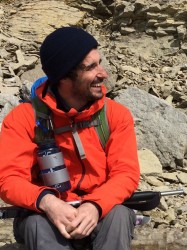BibTex format
@article{Castiello:2018:10.1111/pala.12345,
author = {Castiello, M and Brazeau, MD},
doi = {10.1111/pala.12345},
journal = {Palaeontology},
pages = {369--389},
title = {Neurocranial anatomy of the petalichthyid placoderm Shearsbyaspis oepiki Young revealed by X-ray computed microtomography},
url = {http://dx.doi.org/10.1111/pala.12345},
volume = {61},
year = {2018}
}

